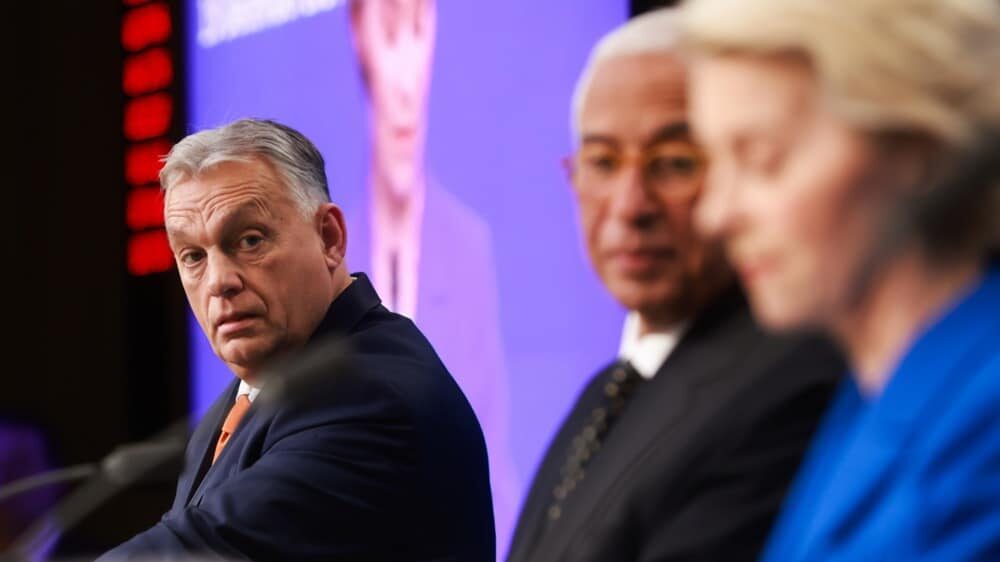
For the first time in 15 years, Viktor Orban faces the real possibility of losing power as Peter Magyar’s opposition party leads in the polls. The outcome could reshape Hungary’s foreign policy, with direct implications for the EU.
Two speeches on July 26 presented utterly different Hungarian foreign policy visions. Prime Minister Viktor Orban, in his traditional summer address, attacked the EU and repeated familiar anti-Western lines; opposition leader Peter Magyar, by contrast, declared unequivocally: Hungary belongs to the West.
If Magyar’s Tisza party wins the spring 2026 general election, a shift in tone and approach is likely: fewer veto blockades, an end to deliberate diplomatic isolation, and a more constructive posture toward allies. But on migration and Ukraine’s EU accession, Magyar’s line is more cautious. Orban’s legacy continues to shape the debate, and the EU should take note of this.
Orban’s foreign policy: loyalty to the East, blockade in the West
Orban’s July speech outlined a familiar goal: Hungary should remain in the EU, but without aligning itself with its liberal values. Echoing Kremlin talking points, he claimed the war in Ukraine was the result of EU and NATO enlargement. The EU, he said, had “chosen war” and was trying to drag Hungary into it, something his government would resist. Orban reiterated his skepticism about supporting Ukraine ahead of the summit between Donald Trump and Vladimir Putin in Alaska on Friday. He also claimed that Russia has won the war and refused to sign a joint EU statement backing Ukraine ahead of the summit talks. He said after the summit that “the world is a safer place than it was yesterday”.
In his speech, Orban went further, predicting that within years, cities like Berlin, Vienna and Paris would have Muslim majorities. In about a decade, he warned, a Hungarian prime minister might have to defend the western border against migration – a nod to the fence at the Serbian border and hardline measures introduced during the 2015 refugee crisis.
Orban also returned to a recurring grievance: the withholding of EU funds over rule-of-law breaches, which is hurting the Hungarian economy. He insisted Hungary should still receive the money without addressing any of the EU’s concerns.
At the same time, he accused Tisza of plotting, if in power, to take the country into war in exchange for releasing EU funds and adopting more open migration policies. His own plan is different: Orban would use the next EU budget negotiations to pressure Brussels into releasing the funds.
Magyar’s alternative: Westward without illusions
Magyar offers a different strategic vision: EU and NATO membership are central to Hungary’s national interest and give the country influence it cannot afford to lose. The 2026 election, he argues, will serve as a referendum on Hungary’s place in these alliances.
Yet Magyar – once a Fidesz insider – knows the domestic terrain. Public opinion has been shaped for years by Fidesz’s relentless narrative since the 2015 migration crisis. Against this backdrop, Magyar stresses that constructive engagement in Brussels, without constant vetoes or diplomatic isolation, is fully compatible with strict migration controls.
Magyar announced he would continue to push the EU to fund Hungary’s border fence with Serbia and reject mandatory refugee relocation quotas, but without violating EU law.
In contrast to Orban, Magyar stated unambiguously that responsibility for the war in Ukraine lies solely with Russia. At the same time, he argued against the rushed accession of Ukraine into the EU.
Magyar’s caution is a reflection of reality: Orban has had 15 years to entrench his positions on migration and Ukraine in the public mind. No new political movement can instantly dismantle those attitudes.
This doesn’t mean that nothing can change. A Tisza-led government might not execute a radical pivot overnight, but it could drop the EU-baiting rhetoric and stop the deferential gestures toward Moscow, Beijing or Trump. The alternative is clear: Orban stays, blocks the next EU budget, and stalls aid to Ukraine – at a moment when achieving European unity is more important than ever.
What the EU should, and should not, do
The two speeches of July 26 reveal a decisive moment: Orban doubling down on his anti-Western stance; Magyar signalling a careful but real reorientation.
How should the EU and member states respond? By exercising restraint. Publicly siding with Magyar would be a gift to Orban’s propaganda machine. Tisza is a member of the European People’s Party (EPP), a grouping of centre-right parties in the European Parliament, led by German CDU politician Manfred Weber. Orban’s media machine is already in overdrive, portraying Magyar as a puppet of Weber and European Commission President Ursula von der Leyen.
Quiet diplomacy on the EU’s part would be far more effective. The less demonstrative closeness that the EU and Berlin show to Hungary’s opposition, the more credible Magyar remains at home – and the greater his chances in the decisive 2026 vote.
Whether change will actually happen remains uncertain. But for Brussels and Berlin, one thing should be clear: a change of government in Budapest is in the interests not only of the Hungarian people but also of Europe as a whole. For that to happen, Magyar must be given enough political space – especially on migration and Ukraine – to prevail at home.
